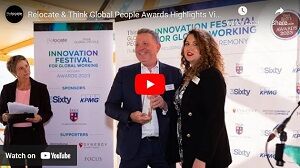The value for research in global people management
Each year the Think Global People and Relocate Awards recognise the Best Research contribution for excellence within the leadership and management of global people. Dr Sue Shortland explains why and how research provides the impetus for learning and continual improvement.

NASA astronaut, Tony Antonelli, keynote speaker at the Innovation Festival for Global Working commented as to whether we might know 95% of all there is to know and have just 5% to learn or whether we only know 5% and still have 95% left to learn. His view was that we still have 95% of learning to do and it is upon this premise that the role of research comes to the fore. The aim of research is to find new understandings and solutions and to advance our knowledge for the future for the benefit of all generations globally. The value of research to those working in global leadership and mobility is therefore paramount to future actions that will make the management of people globally a sure success.
Medical vs social science research
The recent Covid pandemic has demonstrated the value of medical research in producing vaccines that have reduced the death toll and helped to prevent serious illness as a result of this new human threat.However, the production of the new types of vaccines used did not come from overnight work in direct response to the pandemic itself. The new types of vaccines began their development long before the pandemic and it was this previous research effort that formed the foundation for concentrated research activity in this field once the pandemic began to ensure that a new generation of vaccines were fit for purpose to tackle Covid. It was only through prior research effort ahead of a crisis that scientists were able to produce the new types of vaccines that were so effective so speedily.Parallels can be drawn in social science research. Efforts made to understand the application of theoretical frameworks and concepts and to develop and extend these within the context of differing human resource activities and problems can lay the foundations for decisionmaking for effective leadership and management in future, potentially unanticipated, scenarios. In essence, by investing in social science research now, we are setting the groundwork in place to understand new concepts and activities in the deployment of people in the future. All research – even if it is not carried out in response to a direct threat or immediate requirement – has potential value for ensuring efficient and effective global people management strategies going forward.Types of research
Research can take many forms – it can be based on wider scale quantitative survey work or much smaller scale qualitative approaches or indeed a mix of the two. Survey data provide us with a snapshot of practice and comparisons over time can give us information to determine trends. Quantitative Each year the Think Global People and Relocate Awards recognise the Best Research contribution for excellence within the leadership and management of global people. Dr Sue Shortland explains why and how research provides the impetus for learning and continual improvement. data also provide us with the means to use data analytics in order to understand actions taken, cost these out and determine efficient and effective approaches that might be used in future.While quantitative research is no doubt useful, it does not provide the contextual human story and that is why smaller scale interview and/or focus group type research activity can be hugely beneficial to understand the backdrop framing any statistical results. Of course, it is important to be aware of some of the perils of generalisation from typically small-scale qualitative studies but, nonetheless, the human perspective provides us with relevant information to determine appropriate courses of action for the future.Research costs and benefits
All research comes at a price. This may be measured in terms of actual costs and time invested in preparing for and carrying out the research process itself as well as that spent disseminating the findings.It has become increasingly common practice to find service organisations such as those within the relocation industry conducting research – both quantitative and qualitative – in order to assess current trends and predict future best practice. Organisations that engage in research need to weigh up the benefits of so doing. Undertaking research based upon client data (or more widely) is a time-consuming process that draws upon staff resources which, it could be argued, might better be used to service clients’ immediate needs directly. However, without up-todate information on current practice and likely trends, information being provided to clients is only as relevant as what has gone before. Past (i.e. dated) practice may not necessarily be the best predictor of future actions. So keeping up-to-date and investing in blue sky thinking both have definite advantages.Disseminating research is extremely important as if findings are simply restricted to client participants or held by the researching organisation and not shared, any learning gained does not reach a wider audience and so industry generally does not move forward. Only by sharing widely will leadership practice improve globally. Of course, there is a competition element here and organisations conducting research might argue that sharing it freely undermines their unique sales proposition. This is true if the research is being conducted purely for marketing gain but this argument is undermined if there is the prospect that all organisations could benefit and standards improve across the board to the benefit of all.Tony Antonelli made the point that when there is financial gain to be achieved there is the incentive to develop and take forward research propositions. Organisations conducting research therefore need to assess the extent to which they are prepared to invest time and money in their research effort if this is not going to produce a specific payback balanced against time that could be spent on client operations. This can be a difficult judgement call and when money is tight, investment in learning and development does tend to drop off. While this is understandable, it can be argued as being rather short-sighted because continual improvement through the benefit of the learning and knowledge that flow from research efforts helps to give organisations a competitive edge and generates the impetus to strive continually for better and better service.Recognition as a market leader in research also generates its own rewards – being recognised for research excellence highlights the capability of the firm investing in the research effort – thereby setting it apart from its competitors as an up-to-date and knowledgeable organisation. Being widely known and recognised for research capability also attracts the best talent and thus the human capital of the business is also improved.All-in-all, research in global people leadership and management brings a host of benefits to those willing to invest in this activity. And that is why Think Global People supports research activity and rewards excellence in this area of innovation in global working.Download Awards Supplement here (High res - 36059KB)
Watch the Award Ceremony video highlights
©2024 Re:locate magazine, published by Profile Locations, Spray Hill, Hastings Road, Lamberhurst, Kent TN3 8JB. All rights reserved. This publication (or any part thereof) may not be reproduced in any form without the prior written permission of Profile Locations. Profile Locations accepts no liability for the accuracy of the contents or any opinions expressed herein.


























